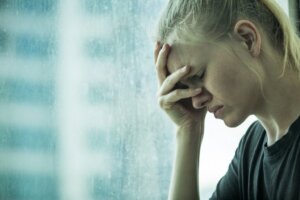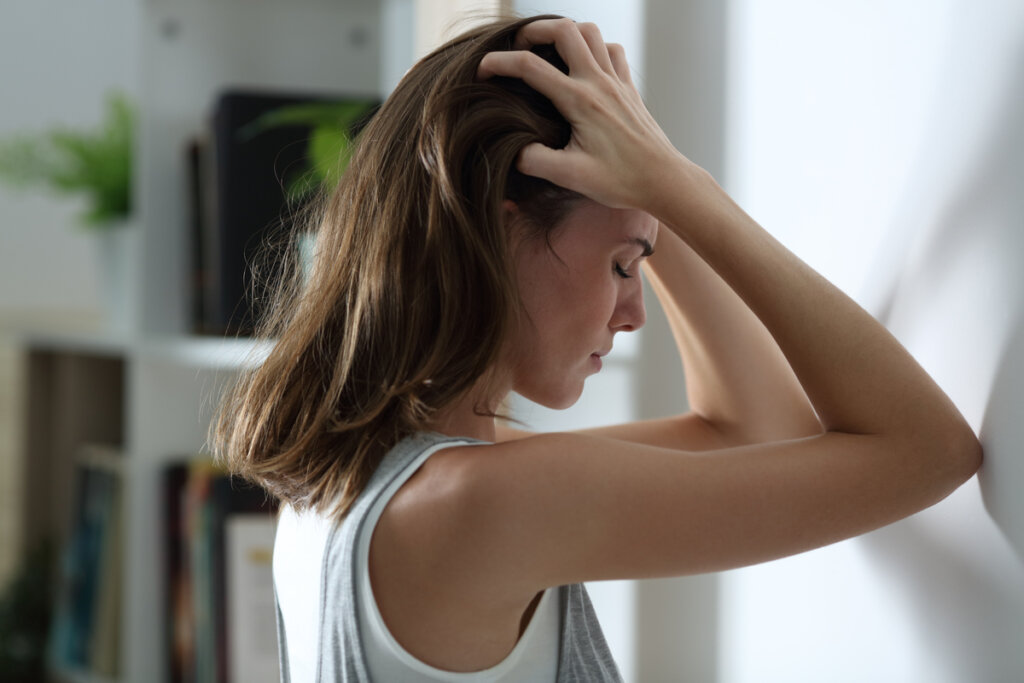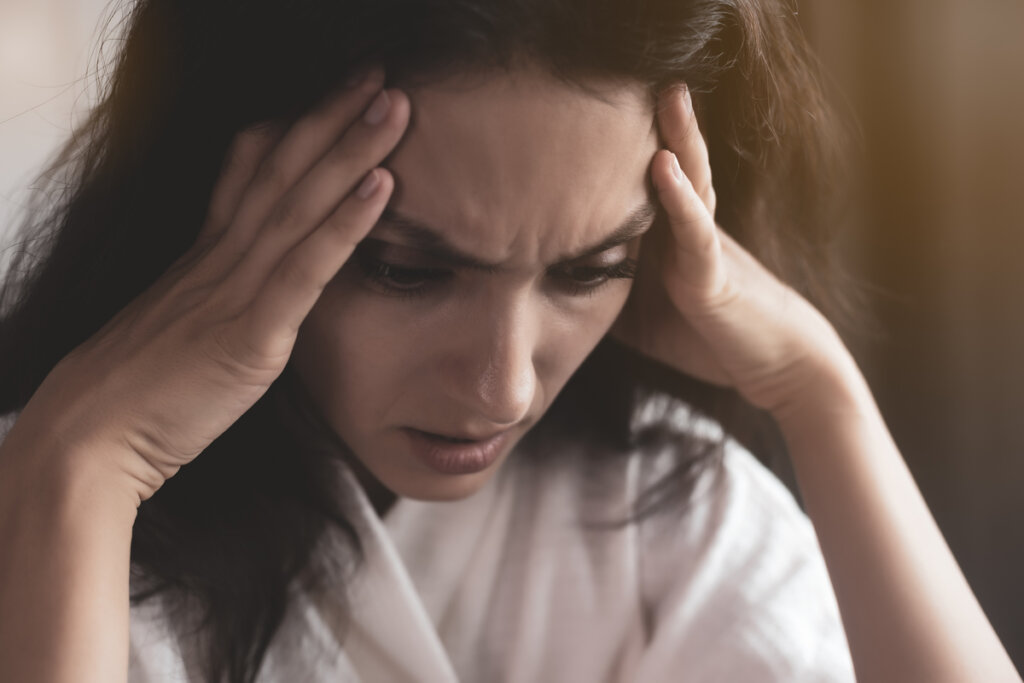Five Habits That Make Anxiety Worse


Written and verified by the psychologist María Vélez
Anxiety is an emotion or psychological reaction that occurs when a situation is perceived as threatening or overwhelming. Although it’s a natural response, if experienced chronically, an anxiety disorder can develop. Therefore, in order to avoid greater discomfort, it’s important to know the habits or behaviors that worsen anxiety.
Anxiety is usually related to everyday events and worries. For example, stress at work, having a family member who’s sick, or major changes. Therefore, it’s a good idea to take care of anxiety levels day by day, paying attention to the little details.
Anxiety risk factors
As we said above, anxiety is usually associated with events or aspects of everyday life that cause fear and concern. However, whether it becomes a disorder depends on a number of factors. These risk factors, for the most part, are related to the environment and the individual’s habits. They give us clues as to what must be prevented if anxiety isn’t to worsen.
Some people develop an anxiety disorder because they have a greater biological predisposition to these kinds of conditions. This might be due to the presence of other disorders, or because they’ve experienced a traumatic event. In other people, the risk may be related to factors such as :
- Accumulation of stress for a long time.
- Substance use.
- Fear of suffering, or developing an illness.
- Stressful life events such as grief or migration.
- Learning through different parenting styles.

What habits make anxiety worse?
There are many everyday factors that affect your emotions, sometimes almost without you realizing it. Anxiety isn’t free from this influence and can worsen if you don’t take care of your environment.
The good news is that these factors can be controlled. Therefore, if you need to reduce anxiety or prevent it from escalating, make sure you pay attention to the following:
1. Lack of sleep
Sleep is the most important part of your rest and it plays a really important role in stress management. Sleep deprivation can cause you to seek out extra tension to stay awake. In other words, your body responds as if it were in a dangerous situation, releasing more cortisol, increasing your heart rate, and generating a state of alert.
This state of alertness increases your feelings of worry, fear, and, restlessness. In short, it causes anxiety to worsen, especially if your lack of adequate sleep is extended over time.
2. Poor diet
Your diet also affects you in many ways. In fact, scientific evidence supports the hypothesis that an unbalanced or incomplete diet can increase the risk of anxiety. One reason is that the lack of adequate food leads to a drop in blood sugar that causes symptoms to appear.
In addition, there are specific nutrients related to anxiety, so a deficit can make it worse. For example, calcium, omega-3, magnesium, and B vitamins are nutrients that help your body fight anxiety.
3. Spending a lot of time at home
The link between not leaving the house and anxiety has been evidenced by the confinement experienced due to COVID-19. In fact, when you’re at home for a long time without keeping yourself busy, your fears and worries grow.
Moreover, this effect is more harmful when you’re alone and when you don’t do any physical activity. However, just ten minutes of daily exercise can reduce the chance of developing anxiety by up to 25 percent.
Therefore, it’s important to maintain contact with people, go out and socialize, and keep your mind stimulated and your body active.
4. Disorganization
Although it may seem like an unimportant detail, a lack of organization or routine intensifies anxiety. Not having regular daily habits can affect the elements that we mentioned above. For example, your sleeping or eating habits.

Also, not organizing your time and even your ideas can affect your personal relationships, causing you to forget important details or appointments. A lack of organization is also damaging if your list of tasks or personal goals is chaotic. It gives way to procrastination, abandonment, or an accumulation of activities you have to do.
5. Too much caffeine or alcohol
Consuming a lot of caffeine and energy drinks worsens your anxiety. These stimulating substances work by raising your level of alertness and increasing your heart rate. What’s more, if you already suffer from an anxiety disorder, drinking too much caffeine can increase the risk of you having a panic attack.
The case of alcohol is somewhat different. That’s because its consumption causes an increase in the level of serotonin and GABA, a neurotransmitter with a relaxing effect. With alcohol, your brain feels relaxed and ‘happy’. So, when its effect wears off, your body goes into fight or flight mode, because it feels the lack of that pleasant state, especially if the consumption is continued.
How to improve
Taking the above into account, if you want to stay balanced and prevent your anxiety from getting worse, try to lead a healthy life, with quality sleep and a clear routine. Do activities that stimulate your body and mind, but that don’t include coffee and alcohol! Think of a list of activities to do each day and prioritize your tasks. Get together with friends, go on a nature walk, or to the beach.
Above all, if you feel that you can’t control your anxiety, seek the help of a professional to support you in this process. They’ll certainly help you feel better.
Anxiety is an emotion or psychological reaction that occurs when a situation is perceived as threatening or overwhelming. Although it’s a natural response, if experienced chronically, an anxiety disorder can develop. Therefore, in order to avoid greater discomfort, it’s important to know the habits or behaviors that worsen anxiety.
Anxiety is usually related to everyday events and worries. For example, stress at work, having a family member who’s sick, or major changes. Therefore, it’s a good idea to take care of anxiety levels day by day, paying attention to the little details.
Anxiety risk factors
As we said above, anxiety is usually associated with events or aspects of everyday life that cause fear and concern. However, whether it becomes a disorder depends on a number of factors. These risk factors, for the most part, are related to the environment and the individual’s habits. They give us clues as to what must be prevented if anxiety isn’t to worsen.
Some people develop an anxiety disorder because they have a greater biological predisposition to these kinds of conditions. This might be due to the presence of other disorders, or because they’ve experienced a traumatic event. In other people, the risk may be related to factors such as :
- Accumulation of stress for a long time.
- Substance use.
- Fear of suffering, or developing an illness.
- Stressful life events such as grief or migration.
- Learning through different parenting styles.

What habits make anxiety worse?
There are many everyday factors that affect your emotions, sometimes almost without you realizing it. Anxiety isn’t free from this influence and can worsen if you don’t take care of your environment.
The good news is that these factors can be controlled. Therefore, if you need to reduce anxiety or prevent it from escalating, make sure you pay attention to the following:
1. Lack of sleep
Sleep is the most important part of your rest and it plays a really important role in stress management. Sleep deprivation can cause you to seek out extra tension to stay awake. In other words, your body responds as if it were in a dangerous situation, releasing more cortisol, increasing your heart rate, and generating a state of alert.
This state of alertness increases your feelings of worry, fear, and, restlessness. In short, it causes anxiety to worsen, especially if your lack of adequate sleep is extended over time.
2. Poor diet
Your diet also affects you in many ways. In fact, scientific evidence supports the hypothesis that an unbalanced or incomplete diet can increase the risk of anxiety. One reason is that the lack of adequate food leads to a drop in blood sugar that causes symptoms to appear.
In addition, there are specific nutrients related to anxiety, so a deficit can make it worse. For example, calcium, omega-3, magnesium, and B vitamins are nutrients that help your body fight anxiety.
3. Spending a lot of time at home
The link between not leaving the house and anxiety has been evidenced by the confinement experienced due to COVID-19. In fact, when you’re at home for a long time without keeping yourself busy, your fears and worries grow.
Moreover, this effect is more harmful when you’re alone and when you don’t do any physical activity. However, just ten minutes of daily exercise can reduce the chance of developing anxiety by up to 25 percent.
Therefore, it’s important to maintain contact with people, go out and socialize, and keep your mind stimulated and your body active.
4. Disorganization
Although it may seem like an unimportant detail, a lack of organization or routine intensifies anxiety. Not having regular daily habits can affect the elements that we mentioned above. For example, your sleeping or eating habits.

Also, not organizing your time and even your ideas can affect your personal relationships, causing you to forget important details or appointments. A lack of organization is also damaging if your list of tasks or personal goals is chaotic. It gives way to procrastination, abandonment, or an accumulation of activities you have to do.
5. Too much caffeine or alcohol
Consuming a lot of caffeine and energy drinks worsens your anxiety. These stimulating substances work by raising your level of alertness and increasing your heart rate. What’s more, if you already suffer from an anxiety disorder, drinking too much caffeine can increase the risk of you having a panic attack.
The case of alcohol is somewhat different. That’s because its consumption causes an increase in the level of serotonin and GABA, a neurotransmitter with a relaxing effect. With alcohol, your brain feels relaxed and ‘happy’. So, when its effect wears off, your body goes into fight or flight mode, because it feels the lack of that pleasant state, especially if the consumption is continued.
How to improve
Taking the above into account, if you want to stay balanced and prevent your anxiety from getting worse, try to lead a healthy life, with quality sleep and a clear routine. Do activities that stimulate your body and mind, but that don’t include coffee and alcohol! Think of a list of activities to do each day and prioritize your tasks. Get together with friends, go on a nature walk, or to the beach.
Above all, if you feel that you can’t control your anxiety, seek the help of a professional to support you in this process. They’ll certainly help you feel better.
All cited sources were thoroughly reviewed by our team to ensure their quality, reliability, currency, and validity. The bibliography of this article was considered reliable and of academic or scientific accuracy.
- Murphy, M., & Mercer, J. G. (2013). Diet-regulated anxiety. International journal of endocrinology, 2013, 701967. https://doi.org/10.1155/2013/701967
This text is provided for informational purposes only and does not replace consultation with a professional. If in doubt, consult your specialist.







